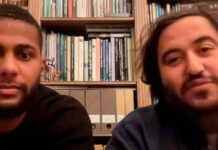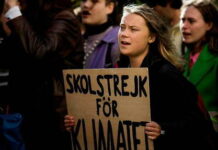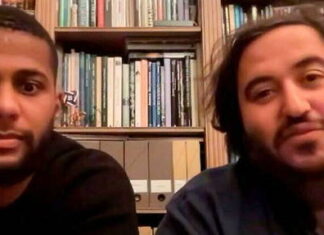After the Grand Prize for Poetry from the French Academy in 2009, the Goncourt Prize for Poetry in 2011, and so many others, the Lebanese poet – who doesn’t like the word poetess and prefers to remain a poet! – receives the Ganzo prize, chaired by Alain Borer and awarded each year at the Étonnants Voyageurs festival in Saint-Malo, which opens this Pentecost weekend. It rewards a major French-speaking author, “in touch with the movement of the world, far from the closed field of formalist laboratories and postmodern affectations”. From People of the Water to Get away from my window (the last book to appear), passing through the magnificent Where the Trees Go, 3 of the 25 collections of poems she has published, Vénus Khoury-Ghata (which is also the author of 26 novels) is still in the last selection of the Pierre de Monaco prize for all of her work. Open to the world, it imposes itself, and internationally, as one of the major voices of French-speaking poetry. But how did the one who fights with words against the misfortunes of her native country, Lebanon, the mourning and the weight of the years, fall in love with poetry?
Le Point: Robert Ganzo (1898-1995), who was a friend of André Breton and Paul Éluard, has a prize in his name created by his widow and awarded by the Fondation de France. You receive it, after many other rewards: what does it mean to you?
Vénus Khoury-Ghata: Robert Ganzo is a French-speaking Venezuelan poet, and everything that is Francophonie interests me, his poetry changed from that of the time, because his lyricism is restrained, and above all not sweet! The jury that gives me this prize is made up of excellent poets: Alain Borer, who chairs it, forgetting that he was himself a poet, gave Rimbaud a popular dimension, introduced him to those who did not read him not. With Yvon Le Men, I remember a wonderful poetry dialogue in Beirut. Jean-Baptiste Para is the author of magnificent collections, and continues to work at the Revue Europe, which was my home, my family when I arrived in France.
And what poets are Dominique Sampiero, and Jean-Pierre Siméon: the poetry of the latter takes great strides, and he does me the honor of welcoming me to his collection NRF Poésies Gallimard, a pocket edition which is within reach of all and especially of my compatriots in Lebanon. More affordable than the collections of the Mercure de France, but I am lucky to be published there alongside Yves Bonnefoy, Adonis, Franck Venaille… And then I was only once in Saint- Malo, this magical festival where Michel Le Bris was able to bring together writers from all over the world and dialogue in such a way that we would have liked to engrave their exchanges in our ears, so as not to forget them.
Have you even been a member of several poetry juries, and there is even a Venus Khoury-Ghata prize… Have you made any discoveries recently?
I’m a member of eight poetry juries (laughs)! I have a lot of novelist friends, novelists… But I never have the same excitement in a poetry jury as in those of the novel. Each of us carries a collection, with his emotion! The prize that bears my name was created to highlight the poetry of women, this is close to my heart, as a juror also for the Max Jacob or Apollinaire prizes. There was Béatrice Bonhomme, Marie Étienne, Caroline Boidé, (1) or even this Bulgarian who impressed me a lot, and also Aksinia Mihaylova who received the Max Jacob foreign prize for Le Baiser du temps (Gallimard). The prizes are a great recognition, the literary community has been very generous with me. That said, when I got the Goncourt Poetry Prize, I thought I was going to sell 100,000 copies! A Goncourt Prize! And I expected to see the photographers after the meal: I did see one, but he was photographing a dead pigeon! (laughs)
What is poetry for?
To live ! When I’m sick, like now, my doctors, two Lebanese, who are like my sons, tell me, “Write poems, it will do you good.” I take the computer to my bed and time to write, yes, I’m fine.
How did you come to poetry, writing?
By my brother. We lived in Lebanon in a grim house because of a father who should have been a monk, but defrocked himself to marry my mother. Our way of life was almost clerical, the guilt never left me, if I came home without being first in my class in particular… And then a window opened: my brother Victor, 4 and a half years older, who wrote his essays in alexandrines, wrote poems since the age of 12. And we published it in the Lebanese newspapers.
I was 9 years old, he was 13 years old and he was reading his poems to me under the street lamp, I was crying with emotion, it was very beautiful. He introduced me to poetry. Without him, I would have been a nun. After I took revenge for this purity that my father wanted, I got married, I divorced, I lived as a free woman, I left Lebanon, to change my life, to live poetry, writing … I was very lucky, beautiful children, and then the immense misfortune of losing my second husband who died at 52 years old.
Victor, he sent his poems to Gallimard, he went to Paris, we didn’t publish him… He lived a marginal life, they said he was drugged, homosexual, my father attacked him. He didn’t write anymore. But from Paris he wrote to me: “Your brother is becoming the new Rimbaud. »
When you arrive in Paris, how are you received by the French community?
I was 30 years old, I was welcomed by great poets, Pierre Seghers brought me into this world, where I met Georges-Emmanuel Clancier, Claude Esteban, Jean Rousselot… Alain Bosquet opened up all my the doors, he was very close to the French speakers. Before he died, he had said, “I will be reborn as a poplar.” Lots of poplars then… Since “Bosquet”… Every time I come across a poplar, I see Alain. They gave me the Apollinaire prizes, then the Mallarmé prizes, those were the best years of my life. I only saw poets, I was the only woman among them, who liked to cook and entertain, all the awards meetings were held at my house, so happy to be immersed in their discussions, I learned from them a a certain conciseness, a certain austerity, which in no way detracts from the emotion. The medium was so generous with me. Régine Desforges had asked me for an erotic novel, but I rejected my first five novels. Then I combined the two, novels and collections of poems. My poetry is also narrative, I tell stories.
Your name is Venus and you translate the poet Adonis, published in the same collection at the Mercure de France, how do you live with this first name?
My parents chose the letter V for the children, Victor, Victorine, Venus. My first name weighed on me so much! Still when I was young, and not too badly… I kept it as a challenge, but at my age… And yes, Venus and Adonis (smile), it translates for me, and I like to translate it. Arabic and French do not have the same poetic rhythm at all, the same resonance, Arabic likes metaphors, in French we have as few as possible.
Excerpt from the latest collection: Get away from my window (Mercure de France) He will come back the path wants him the path repeated it at the threshold the threshold disclosed it to passers-by the pine needles on its soles will not last until the winter marauder nor poacher but silent dead will come back with his wrinkles in his heart will show off his mangled throat to the light that darkened him
(1) Read: Your song is longer than your breath; interviews with Caroline Boidé (Archipelago, 2019)


















